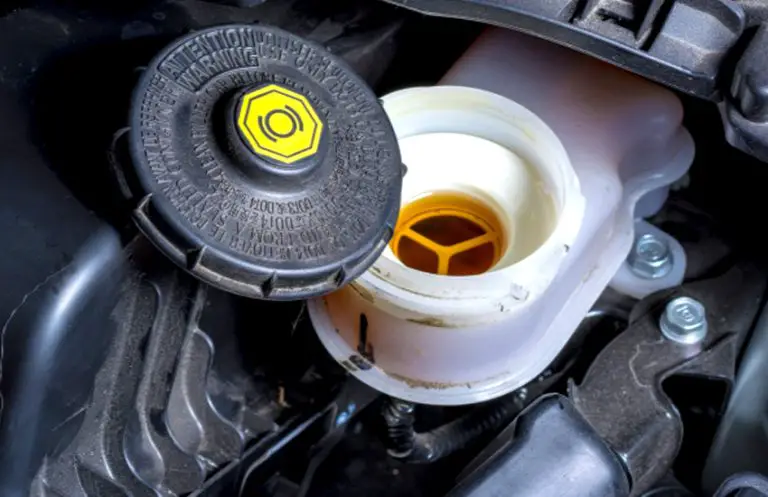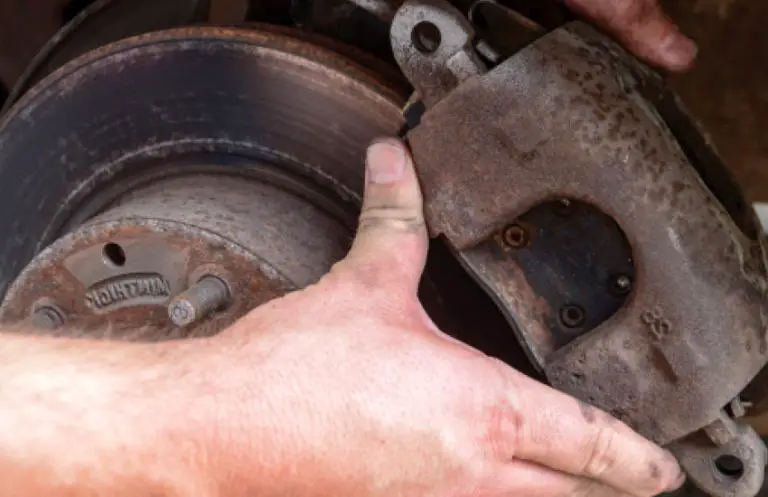When we think about car maintenance, we often focus on oil changes, tire rotations, and brake inspections. However, one question that may not cross our minds is: can brake fluid harm tires? This inquiry is more significant than it appears, as understanding the potential dangers of brake fluid can help ensure our vehicles remain safe and in top condition.
Brake fluid is an essential part of any vehicle’s braking system, as it transfers force from the brake pedal to the brakes themselves. However, this vital fluid can have unintended consequences if it comes into contact with other vehicle components, particularly tires. In this blog post, we will explore how brake fluid interacts with tires, the risks involved, and steps you can take to prevent any potential damage.
What Is Brake Fluid and Its Purpose?
Understanding Brake Fluid
Brake fluid is a type of hydraulic fluid used in brake systems to facilitate the transfer of force when the driver presses the brake pedal. There are two main types of brake fluid: glycol-based and silicone-based. Glycol-based fluids are the most common, while silicone-based fluids are often used in high-performance vehicles due to their higher boiling points and better resistance to moisture.
The primary function of brake fluid is to provide a safe and effective means of transferring force. When you step on the brake pedal, it pushes a piston in the master cylinder, which then sends the brake fluid through the brake lines to the brake calipers. This process activates the brakes, allowing your vehicle to slow down or stop.
In addition to transferring force, brake fluid serves several other purposes, such as lubricating the braking system components and preventing corrosion. However, it is also hygroscopic, meaning it can absorb moisture from the air over time. This absorption can lead to a decrease in performance and the potential for brake failure if not monitored and replaced regularly.
The Composition of Brake Fluid
Brake fluid consists of various chemicals designed to withstand the heat and pressure generated during braking. Common components include:
- Ethylene Glycol: A primary ingredient in glycol-based brake fluids that helps maintain fluid consistency.
- Additives: These include corrosion inhibitors, lubricants, and anti-foaming agents that enhance the fluid’s performance and longevity.
- Water: Brake fluid naturally absorbs moisture, which can be a double-edged sword. While it helps prevent rust in the brake system, excessive moisture can lead to vapor lock and reduced braking efficiency.
Understanding the composition of brake fluid is crucial when considering its effects on other vehicle components, particularly tires.

How Brake Fluid Can Harm Tires
The Chemical Reaction
Brake fluid is designed to withstand high temperatures and pressures, but its chemical properties can be harmful to rubber and other materials used in tire manufacturing. The primary concern is that brake fluid can cause rubber to deteriorate. When brake fluid comes into contact with tire rubber, it can lead to the following:
Swelling and Softening: The rubber compounds in tires are designed to be durable, but they can become soft and swell when exposed to brake fluid. This change can compromise the tire’s structural integrity and lead to a reduced lifespan.
Cracking and Drying: Over time, exposure to brake fluid can cause the rubber to dry out and crack. This deterioration can lead to air leaks, making the tire more prone to blowouts and requiring premature replacement.
Loss of Traction: A tire’s rubber composition is vital for maintaining traction on the road. If brake fluid causes the tire to soften or crack, the grip may be significantly reduced, increasing the risk of accidents, especially in wet or slippery conditions.
How Brake Fluid Gets on Tires
Understanding how brake fluid can come into contact with tires is essential for preventing damage. Here are some common scenarios:
Leaking Brake Lines: One of the most common ways brake fluid can reach tires is through leaks in the brake lines. If there is a crack or hole in the lines, brake fluid can seep out and drip onto the tires.
Improper Maintenance: During brake service, if brake fluid is spilled on or around the tires, it can lead to damage. Mechanics need to be careful when working on brakes to avoid spilling fluids.
Accidental Spills: Routine maintenance tasks, like topping off brake fluid, can result in accidental spills on or near the tires. It’s important to clean up any spills immediately to avoid potential damage.
Brake Pad Wear: Worn brake pads can produce debris and dust that may contain brake fluid remnants. This debris can accumulate on the tire surface and cause damage over time.
Symptoms of Damage
Recognizing the signs of brake fluid damage on tires can help you take action before the situation worsens. Here are some common symptoms to watch for:
Visible Cracks: If you notice small cracks or signs of drying on the sidewalls of your tires, this could indicate brake fluid exposure.
Softening Rubber: If the tires feel unusually soft or spongy to the touch, this might be a sign that the rubber has absorbed brake fluid and is starting to deteriorate.
Uneven Wear: If you notice that your tires are wearing unevenly, it could be a sign of damage caused by exposure to brake fluid or other factors.
Decreased Traction: If you find that your vehicle is not handling as well as it used to, it might be due to compromised tires from brake fluid exposure.
By being aware of these symptoms, you can take action to inspect your tires and address any potential issues before they lead to more serious problems.
Preventing Brake Fluid Damage to Tires
Regular Maintenance Checks
One of the best ways to prevent brake fluid from harming your tires is through regular vehicle maintenance. Here are some steps you can take:
- Check Brake Lines: During routine maintenance, have a mechanic inspect your brake lines for leaks or damage. Early detection can help prevent brake fluid from reaching your tires.
- Inspect Tires: Regularly inspect your tires for signs of wear and damage. Look for cracks, bulges, or other irregularities that could indicate exposure to harmful substances.
- Monitor Brake Fluid Levels: Keep an eye on your brake fluid levels and replace it as needed. Regular fluid changes can help maintain the integrity of your braking system and reduce the risk of leaks.
Cleaning Up Spills
If you accidentally spill brake fluid near your tires, it’s crucial to clean it up promptly. Here’s how to do it effectively:
- Soak Up Excess Fluid: Use a clean, absorbent cloth or paper towel to soak up as much brake fluid as possible. Avoid using materials that can leave residue, such as cotton balls.
- Clean the Area: After soaking up the excess fluid, clean the area with soap and water. This will help remove any remaining traces of brake fluid that could potentially harm the tires.
- Rinse Thoroughly: Make sure to rinse the area well to remove any soap residue that might also affect the tire material.
Using Tire Protectants
Some tire protectants are available on the market that can help guard against damage from brake fluid and other harsh substances. These products can create a protective barrier on the tire surface, making it more resistant to chemicals. When choosing a tire protectant, look for products specifically designed for tire care, ensuring they are safe for rubber materials.
The Importance of Tire Health
Why Healthy Tires Matter
Healthy tires are crucial for overall vehicle safety and performance. They play a significant role in:
- Vehicle Handling: Tires directly affect how a vehicle handles, especially in adverse conditions. Worn or damaged tires can lead to poor handling and increased stopping distances.
- Fuel Efficiency: Tires that are in good condition help improve fuel efficiency. Properly inflated and maintained tires reduce rolling resistance, allowing your vehicle to operate more efficiently.
- Safety: Healthy tires provide better traction on the road, reducing the risk of skidding or hydroplaning. They are essential for maintaining control during emergency maneuvers.
Regular Tire Maintenance
To ensure your tires remain healthy, follow these essential maintenance tips:
- Rotate Tires: Rotate your tires regularly to promote even wear. Most manufacturers recommend rotating tires every 5,000 to 7,500 miles, but you should check your owner’s manual for specific guidance.
- Check Tire Pressure: Regularly check your tire pressure to ensure it is within the manufacturer’s recommended range. Under-inflated tires can lead to uneven wear and reduced fuel efficiency.
- Inspect Tread Depth: Use a tread depth gauge or the penny test to check your tire tread. If the tread is worn down to 2/32 of an inch or less, it’s time to replace the tire.
By maintaining your tires properly, you can prevent issues related to brake fluid exposure and ensure your vehicle remains safe and efficient on the road.
I hope this article has shed light on the potential harm that brake fluid can inflict on tires. Understanding the relationship between these two essential components of your vehicle can help you take proactive steps to prevent damage. Regular maintenance, prompt cleaning of spills, and tire health awareness are vital to ensuring a safe and reliable driving experience.
Are These Questions in Your Mind?
Is it safe to drive with brake fluid on my tires?
Driving with brake fluid on your tires is not safe, as it can damage the tire material, leading to reduced traction and potential blowouts.
Can brake fluid cause a tire to go flat?
Yes, brake fluid can damage the tire’s rubber, leading to air leaks and potentially causing the tire to go flat.
Do I need to replace my tires if brake fluid gets on them?
If brake fluid has caused visible damage, such as cracks or significant softening, it’s advisable to replace the tires to ensure safety.
Is it possible to clean tires after brake fluid exposure?
Yes, you can clean tires after brake fluid exposure by soaking up the fluid and washing the area thoroughly with soap and water.
Can brake fluid harm other car parts?
Yes, brake fluid can also damage paint, plastic, and rubber components in your vehicle, so it’s important to handle it carefully.
Is it okay to use brake fluid to clean brake parts?
While brake fluid can help clean some brake parts, it should not be used as a general cleaner, as it can damage other materials.
Do I need special tools to check my brake fluid?
No special tools are needed to check brake fluid; simply locate the reservoir and visually inspect the fluid level.
Is it normal for brake fluid to change color over time?
Yes, brake fluid can change color as it absorbs moisture and becomes contaminated, indicating it may need to be replaced.
Can I use water to dilute brake fluid spills?
No, water should not be used to dilute brake fluid spills, as it can cause further issues. It’s best to clean it up with absorbent materials.
Is there a specific way to dispose of brake fluid?
Yes, brake fluid should be disposed of at a designated hazardous waste facility, as it can be harmful to the environment.


